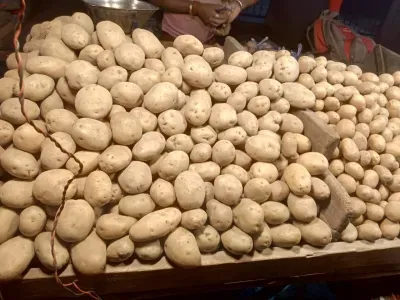Bengal's Retail Potato Prices Expected to Surge as Traders Threaten Unrest

Kolkata, Dec 1 (NationPress) The cost of potatoes, which is already elevated in the retail markets of West Bengal, could potentially increase in the coming week. This follows the traders association's decision to initiate a strike if the current deadlock regarding the state government's prohibition on exporting these vegetables to other states remains unresolved.
Two well-known varieties of potatoes, namely “Jyoti” and
This marks the second instance in just over three months that potato traders in the state, united under the Progressive Potato Traders’ Association, have organized a strike. Their previous strike occurred in August of this year.
An official from the association has asserted that, despite a gradual stabilization of potato prices in retail markets, the state government has enforced a ban on the export of this vegetable to states like Odisha, Jharkhand, Bihar, and Chhattisgarh, which rely heavily on supplies from West Bengal.
“The ban was imposed without any formal notification. Authorities are halting trucks laden with potatoes at the state borders and penalizing traders. In this climate, conducting our business has become unfeasible. Therefore, we have resolved to initiate an indefinite strike starting Monday unless this ongoing situation is addressed,” the association representative stated.
The prohibition on potato exports from West Bengal took effect on November 22, a day after Chief Minister Mamata Banerjee expressed strong objections to the export of potatoes and onions from the state without fulfilling local requirements.
Emphasizing that her government will take a firm stance on this issue, the Chief Minister stated that since the state government provides insurance funds for farmers, she cannot permit the export of such food items before meeting local demands.









